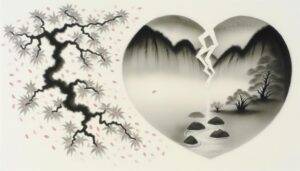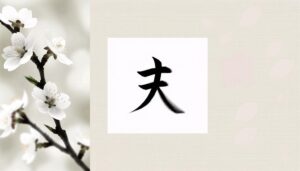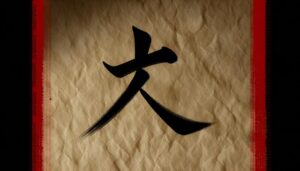What Is the Symbol for Courage in Japanese?
The kanji symbol for courage in Japanese is 勇 (yū). It signifies profound bravery and inner strength, combining the radical for 'strength' (力) with the element for 'water' (水), suggesting resilience and adaptability.
Historically rooted in Samurai culture, 勇 (yū) encompasses both physical valor and moral fortitude, essential to the Bushidō code. In modern times, it represents personal resilience, mental health awareness, and standing up for social justice.
Frequently depicted in Japanese art, calligraphy, and tattoos, this enduring symbol continues to captivate and inspire. Exploring further reveals its rich cultural and historical layers.
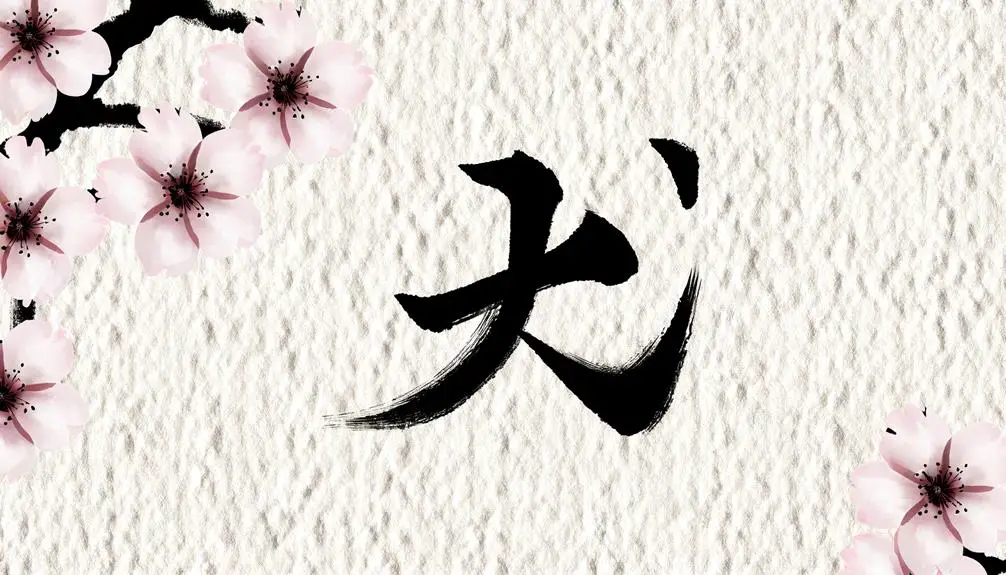
Key Takeaways
- The kanji for courage is 勇 (yū), symbolizing bravery and inner strength in Japanese culture.
- Yūki (勇気) combines bravery and spirit, often depicted in Japanese calligraphy.
- In samurai culture, yūki is central to the Bushidō code, representing martial and moral courage.
- Modern interpretations of yūki emphasize personal resilience, mental health, and social justice.
- Popular culture frequently showcases yūki through characters in anime, manga, films, and video games.
The Kanji for Courage
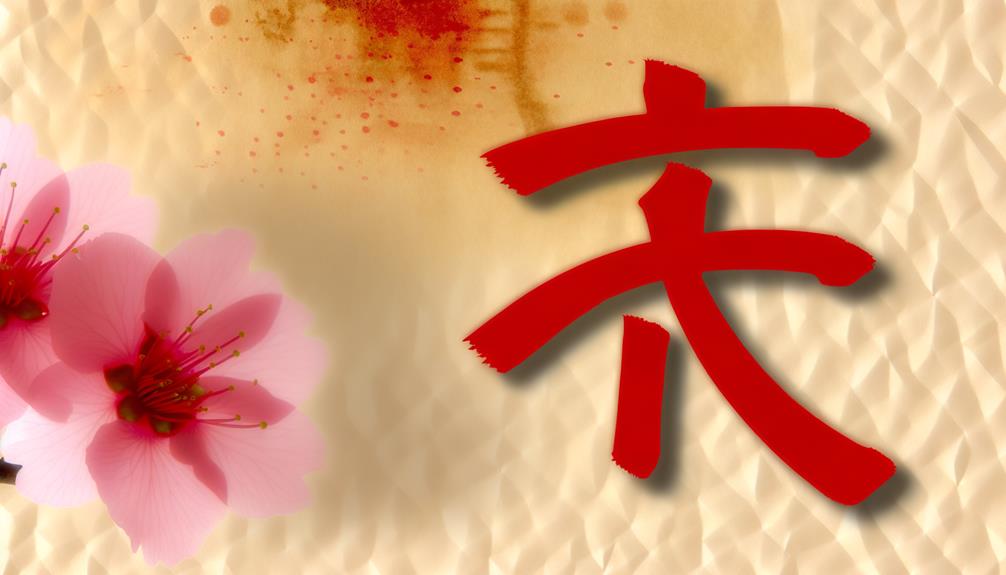
The kanji for courage, 勇 (yū), is a profound symbol deeply rooted in Japanese culture and language.
This character encapsulates the essence of bravery and valor, often depicted in literature, art, and philosophy.
Its structure combines the radical for 'strength' (力) with the element for 'water' (水), suggesting fluidity and resilience.
The character 勇 transcends mere physical bravery, embodying moral fortitude and the inner strength to face adversity.
In contemporary usage, 勇 is seen in expressions and idioms that highlight the importance of courage in various aspects of life, from personal challenges to communal efforts.
Understanding 勇 offers a window into the values and principles that continue to shape Japanese society.
Historical Origins of Yūki
Tracing its lineage back to ancient Chinese script, the concept of yūki has evolved through centuries of linguistic and cultural development.
Initially derived from the Chinese character 勇 (yǒng), which signifies bravery and valor, yūki was later adapted into Japanese kanji, maintaining its core meaning.
Over time, yūki became more than just a literal translation; it absorbed nuances from various cultural influences and philosophical teachings.
The character 勇 in Japanese embodies both physical bravery and inner resilience, reflecting broader societal values.
This evolution underscores the dynamic nature of language and how cultural exchanges shape and deepen the meanings of symbols.
Through continuous adaptation, yūki remains a profound representation of courage in the Japanese lexicon.
Yūki in Samurai Culture
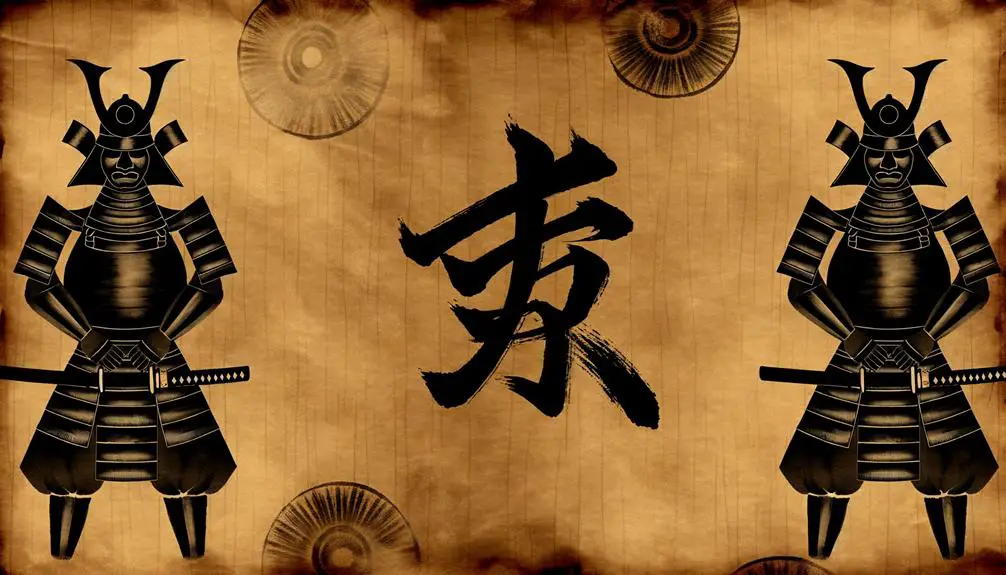
Embedded deeply within the ethos of samurai culture, yūki signifies not only martial bravery but also the moral courage to uphold one's honor and values. Samurai warriors embraced yūki as a guiding principle, essential to their code of conduct, Bushidō.
This profound concept encompassed multiple dimensions:
- Physical Bravery: Demonstrating fearlessness in battle, often against overwhelming odds.
- Moral Integrity: Upholding ethical standards and personal honor even in the face of adversity.
- Resilience: Persisting with unwavering determination despite failures or setbacks.
These elements of yūki were viewed as essential virtues, shaping the identity and legacy of samurai.
Modern Interpretations of Courage
In contemporary Japan, the concept of courage has evolved notably, influenced by cultural shifts and the impact of media.
Modern portrayals in film and literature often emphasize personal resilience and moral bravery over physical combat.
Additionally, real-life narratives of ordinary individuals facing extraordinary challenges serve to redefine and broaden the understanding of courage in today's society.
Cultural Shifts in Meaning
Modern interpretations of courage in Japanese culture reflect a dynamic interplay between traditional values and contemporary societal changes. Historically rooted in the samurai ethos of *bushido*, courage is evolving to address modern realities.
This shift is evident in several ways:
- Mental Health Awareness: Courage now encompasses the bravery to seek help for mental health issues, breaking long-standing societal taboos.
- Gender Roles: Traditional gender-specific notions of bravery are being redefined, with increased recognition of the courage in women's leadership and activism.
- Social Justice: Modern interpretations of courage include standing up for social justice, reflecting global movements and the importance of individual voices in societal change.
These developments illustrate how the concept of courage continues to adapt within the fabric of Japanese society.
Media Depictions of Bravery
Contemporary Japanese media portrays bravery through diverse narratives that reflect both individual and collective courage in facing modern challenges. In anime and manga, characters like Naruto Uzumaki and Izuku Midoriya embody personal valor, overcoming internal and external adversities.
Dramas and films often highlight societal bravery, such as the resilience seen in 'Shin Godzilla,' where citizens unite against a common threat. These portrayals are not limited to fantastical settings but also extend to realistic depictions, showcasing courage in everyday life.
For instance, shows like 'Midnight Diner' illustrate the quiet bravery of individuals facing personal hardships. Through these varied depictions, Japanese media underscores that courage is multifaceted, resonating deeply with contemporary audiences by reflecting real-world complexities and triumphs.
Personal Stories of Valor
Frequently, personal stories of valor in modern Japan highlight individuals who display extraordinary courage in the face of adversity, offering powerful examples of resilience and strength. These narratives often capture the essence of the Japanese symbol for courage, 勇気 (yuuki).
For instance:
- Natural Disaster Survivors: Many individuals who survived the 2011 Tōhoku earthquake and tsunami have shown unwavering resolve in rebuilding their lives and communities.
- Healthcare Workers: Amid the COVID-19 pandemic, Japanese healthcare professionals have demonstrated exceptional bravery while tirelessly caring for patients.
- Social Advocates: Figures like Shiori Itō, who courageously brought attention to issues of sexual violence, inspire others to speak out and seek justice.
These stories embody modern interpretations of courage, emphasizing endurance, compassion, and advocacy.
Yūki in Japanese Calligraphy
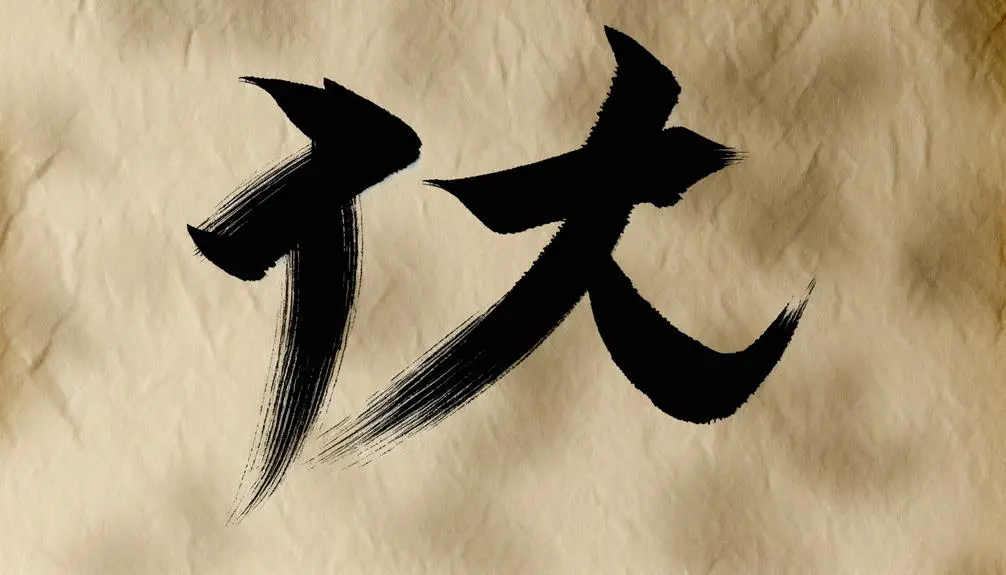
In Japanese calligraphy, the character 勇気 (yūki) is meticulously crafted to embody the essence of courage. This art form, known as shodō, requires the calligrapher to channel both skill and spirit into each brushstroke.
The character 勇 (yū) symbolizes bravery, while 気 (ki) represents energy or spirit, together forming a powerful representation of courageous resolve. The fluidity and precision of the strokes convey not just the meaning but the emotion behind the word.
Calligraphers often spend years perfecting their technique to guarantee that the character resonates with the viewer on a deeper level. The visual harmony and balance found in yūki's calligraphy reflect the harmonious nature of courage itself, blending strength with grace.
Courage in Japanese Folklore
Courage in Japanese folklore is vividly illustrated through the legendary bravery of samurai warriors and the valor depicted in mythical tales. These narratives not only highlight physical prowess but also emphasize the moral fortitude and unwavering resolve that define true courage.
Legendary Samurai Bravery
Embodying the essence of bushido, legendary samurai exemplified unparalleled bravery that has deeply influenced Japanese folklore and cultural values. Their acts of courage were not just physical but also moral, embodying the virtues of loyalty, honor, and self-sacrifice. These warriors adhered to a strict code that demanded unwavering bravery in the face of adversity.
- Loyalty: Samurai were steadfastly loyal to their lords, often sacrificing their lives without hesitation.
- Honor: Maintaining personal honor and the honor of their family was paramount, often more important than life itself.
- Self-Sacrifice: The willingness to lay down their lives for a greater cause demonstrated their commitment to the ideals of bushido.
These principles continue to resonate within Japanese culture, symbolizing true courage.
Mythical Tales of Valor
Throughout Japanese folklore, mythical tales of valor vividly illustrate the profound courage that has been celebrated for centuries. Stories such as those of Momotaro, the Peach Boy, who battles ogres to protect his village, exemplify the virtues of bravery and selflessness.
Similarly, the legend of Yamato Takeru, a prince who undertakes perilous quests, highlights the enduring spirit of heroism. These narratives not only entertain but also convey moral lessons, underscoring the cultural significance of courage.
The characters in these tales often face overwhelming odds, yet their unwavering resolve and inner strength resonate deeply within Japanese cultural consciousness. Such folklore continues to inspire, reflecting an enduring reverence for courage in the face of adversity.
Yūki in Martial Arts
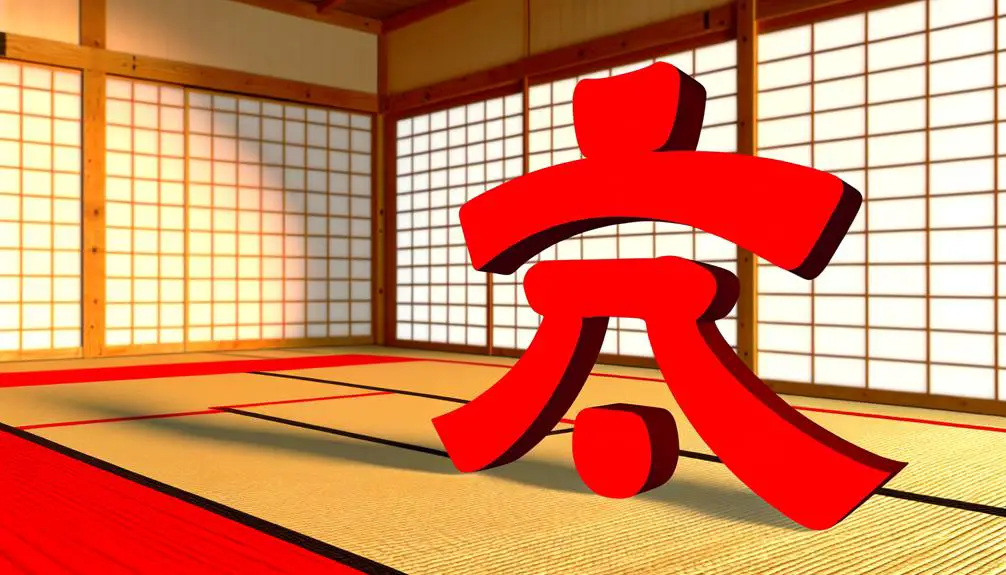
In martial arts, yūki represents not just physical bravery but also the mental fortitude to face challenges and persist in the pursuit of mastery. This concept is integral to the discipline and training that martial artists undergo.
Yūki manifests in various ways:
- Perseverance: Continually pushing through physical and mental barriers during intense training.
- Resilience: Recovering swiftly from defeats or setbacks, understanding that failure is part of the journey.
- Composure: Maintaining calm under pressure, whether in competition or self-defense scenarios.
These elements of yūki are essential for martial artists, guiding them to not only improve their skills but also to develop inner strength and character. The embodiment of yūki transforms a practitioner's approach to both martial arts and life.
Popular Culture References
Popular culture frequently incorporates the symbol of yūki to depict characters who demonstrate exceptional bravery and inner strength. In anime and manga, protagonists often bear the symbol, embodying the essence of courage in their quests and battles.
Films and literature also utilize yūki to highlight moments of profound personal growth and valor. For example, Studio Ghibli's works frequently feature characters who epitomize yūki, such as Ashitaka in 'Princess Mononoke' and Chihiro in 'Spirited Away.'
Video games, too, leverage this symbol to enhance narrative depth, with characters like Cloud Strife from 'Final Fantasy VII' showcasing unwavering resolve. Through these mediums, yūki becomes a powerful emblem, resonating with audiences and inspiring them to find courage within themselves.
Tattoos and Symbolism
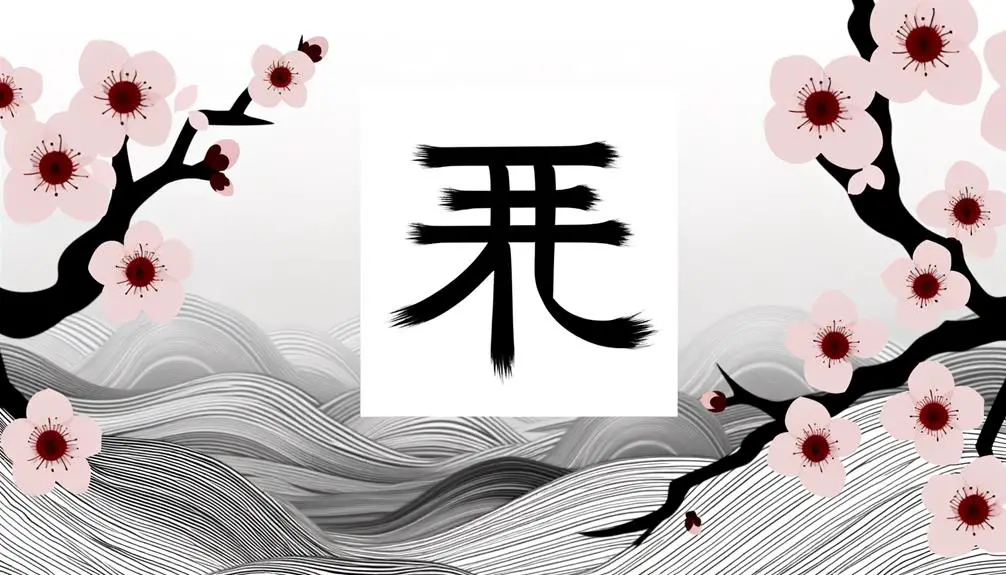
Tattoos featuring the Japanese symbol for courage, 勇気 (yuuki), have gained popularity worldwide, reflecting a deep appreciation for its profound meaning.
These tattoos not only serve as personal emblems of bravery but also highlight the cultural significance and esteem of Japanese calligraphy.
Understanding the historical and societal contexts of this symbol can provide deeper insight into its power and appeal.
Popular Courage Symbols
Courage symbols, particularly in the form of tattoos, have gained widespread popularity for their profound significance and cultural resonance. These symbols serve as powerful reminders of personal strength and bravery.
Among the most popular representations are:
- Kanji Characters: The Japanese kanji for courage, '勇' (yū), is often chosen for its elegant script and deep meaning.
- Lions: Universally recognized as a symbol of bravery and strength, lion tattoos evoke a sense of regality and power.
- Phoenixes: Representing rebirth and resilience, the phoenix is a fitting symbol for overcoming adversity and rising through courage.
These designs resonate deeply with individuals seeking to embody and display their inner fortitude through body art.
Cultural Significance Explained
In various cultures, tattoos and symbols are more than mere decorations— they serve as potent emblems of personal narratives, societal values, and historical traditions.
In Japan, the kanji character for courage (勇, yū) is often chosen for tattoos to signify the bearer's inner strength and bravery. This symbol carries deep cultural resonance, reflecting the samurai ethos of honor and valor.
Tattoos featuring 勇 can act as a daily reminder for individuals to face challenges head-on, embodying a timeless principle revered in Japanese society. Additionally, these tattoos often inspire respect and admiration, connecting the individual to a broader cultural heritage that values perseverance and fortitude.
The choice of 勇 is hence a profound statement of identity and aspiration.
Yūki in Everyday Life
Incorporating yūki into daily routines can profoundly influence one's resilience and decision-making processes. This Japanese concept of courage is not reserved for grand gestures; it manifests in everyday actions that reinforce inner strength and resolve.
By integrating yūki, individuals can:
- Face Challenges Head-On: Confronting difficulties without hesitation builds confidence and fosters personal growth.
- Make Authentic Choices: Courage enables one to make decisions aligned with true values, despite external pressures.
- Embrace Vulnerability: Accepting and expressing emotions openly can create deeper connections and enhance emotional well-being.
Practicing yūki daily encourages a mindset of perseverance and authenticity, allowing individuals to navigate life's complexities with greater fortitude. This approach nurtures a balanced, resilient character capable of enduring various adversities.
Courage in Japanese Proverbs
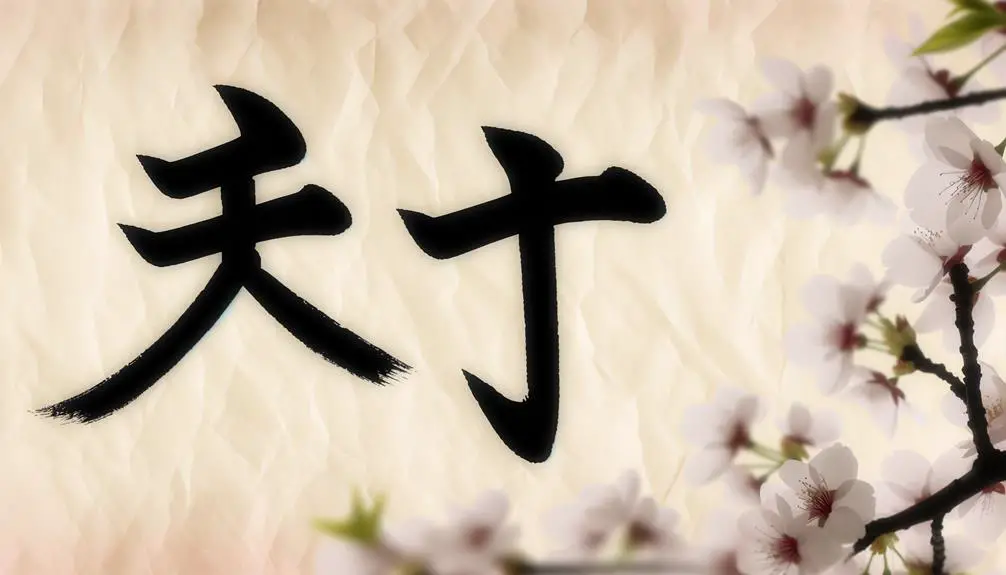
Japanese proverbs often encapsulate the essence of courage, offering timeless wisdom that underscores its significance in daily life. These proverbs not only reflect cultural values but also serve as guiding principles for overcoming adversity. Below is a table highlighting some notable proverbs about courage.
| Japanese Proverb | English Translation |
|---|---|
| 七転び八起き (Nana korobi ya oki) | Fall seven times, stand up eight. |
| 虎穴に入らずんば虎子を得ず (Koketsu ni irazunba koji wo ezu) | Without entering the tiger's cave, you cannot catch its cub. |
| 勇気は一瞬、後悔は一生 (Yūki wa isshun, kōkai wa isshō) | Courage is momentary, regret is eternal. |
| 石の上にも三年 (Ishi no ue nimo sannen) | Perseverance prevails. |
| 猿も木から落ちる (Saru mo ki kara ochiru) | Even monkeys fall from trees. |
These proverbs emphasize resilience, the necessity of taking risks, and the transient nature of failure.
Learning and Writing Yūki
Understanding the importance of courage in Japanese culture can be further enriched by learning to write the kanji for yūki (勇気).
This kanji is composed of two characters: 勇 (yū) meaning bravery, and 気 (ki) meaning spirit or energy. Mastering the writing of yūki involves not only technical skill but also an appreciation of its cultural depth.
- Stroke Order: Correct stroke order is essential for proper kanji writing. It guarantees legibility and preserves the aesthetic flow of the characters.
- Contextual Usage: Knowing how yūki is used in sentences and phrases can enhance your comprehension of its nuanced meanings.
- Calligraphy Practice: Engaging in shodō (Japanese calligraphy) can deepen your connection to the kanji, blending artistic expression with linguistic precision.
Conclusion
The kanji for courage, Yūki (勇気), encapsulates a profound cultural heritage, intricately woven through the tapestry of Japanese history. Its origins rooted in samurai valor, Yūki persists in modern interpretations, carrying an unbroken lineage of bravery and resilience.
As the ink of calligraphy flows or the needle of a tattoo etches, Yūki's significance penetrates deeper than mere symbols. This emblem of fortitude resonates in proverbs, everyday actions, and the hearts of those who dare to embody its essence.



